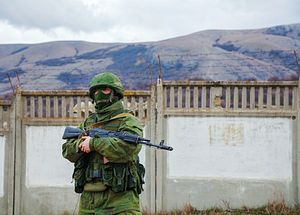In 2015, the impact of the Russian invasion of Crimea will still be felt across Asia. The crisis came as a wake-up call for post-modern Europe, a reminder that existential threats still exist and that conflicts can hardly be avoided because of purely economic calculations of cost and benefit. Asian powers, for their part, are well aware that geopolitics is not a thing of the past.
A situation where an emerging power wants its great-power status back, considers its sovereignty over land and maritime borders as crucial to its security, and sees its near abroad as its own restricted sphere of influence certainly sounds very familiar to any Asian power today. Even if the analogy stops here, one can still ask what lessons Beijing in particular may learn about the international community’s willingness to sanction Russia’s use of force in Ukraine.
From an Asian perspective, the Ukraine crisis poses the question of the future of U.S. engagement in Asia, a question crucial both to U.S. allies and to other regional countries. Will the emergence of this crisis in Europe distract the U.S. from Asia? Will it impact President Barack Obama’s “rebalance” policy? China no doubt hopes that the rise of Russia will deflect U.S. strategic pressure away from Asia, but U.S. allies are similarly wary of this possibility.
The Ukraine crisis also raises questions about the credibility of U.S. preparedness for Asian contingencies: If Washington failed to dissuade Russia’s advance into Crimea, can it manage sovereignty disputes in Asia? If countries like Japan, the Philippines, and Vietnam provide a negative answer to this question, it will have a tremendous impact on their coming political and strategic decisions.
In 2015, Moscow will try to speed up its energy cooperation with Asia in order to counteract Western sanctions and the drop in oil prices. The reconfiguration of energy exchanges has already begun with the two deals signed in 2014 between China and Russia for gas supplies. In addition to ramping up its civil nuclear cooperation, Russia also signed a ten-year crude oil supply deal with India.
After the invasion of Crimea, Russia decided to invest $1 billion in North Korean healthcare, education, and a major natural gas pipeline that will run from the Russian Sakhalin Island fields through the Korean Peninsula. South Korea, the world’s second-largest natural gas importer behind Japan, showed great interest in this project, as well as in other initiatives to connect South Korea’s transportation network to the Trans-Siberian Railway. Russian coal was delivered for the first time to South Korea by rail from Khasan via the North Korean port of Rajin in early December 2014. Paradoxically, Russia’s renewed interest in Asia’s energy markets might facilitate a more integrated Korean Peninsula.
But for a country like Japan, 2015 means more regional actors competing for access to Russian resources. Tokyo’s attempts at a rapprochement with Moscow over the Kurils/Northern Territories have also been complicated by Western sanctions.
For North Korea, Crimea’s annexation demonstrates that it must continue to hold on to its nuclear weapons. Ukraine renounced its nuclear arsenal in 1994 in exchange for security guarantees from the other nuclear powers, including Russia. The Ukrainian denuclearization has often been cited as a possible path for Pyongyang to follow. But for his part, Kim Jung-un might think that a nuclear Ukraine would not have seen its territory amputated.
Finally, Russia’s isolation by the West may spawn a strengthened strategic relationship with China in 2015. There is undoubtedly a level of distrust between the two quasi-allies, but they also share the same fears and the same adversaries – a solid basis for a marriage of convenience. China blames the European Union and NATO for the political disorder in Ukraine that eventually led to Russian intervention.
The scenario of “hostile foreign forces” planting the seeds of crisis resonates quite well with Beijing’s own fears that domestic agitation could be purposefully activated from abroad. Faced with no realistic alternative, Russia could become a more docile partner for Beijing. As China pushes forward a “Silk Road diplomacy,” with Central Asia at the core, it may enjoy greater leeway in this traditional Russian sphere of influence – precisely at a moment when the Central Asian republics may be wary of ending up like Ukraine in Moscow’s hands.
Nadège Rolland is Senior Project Director for Political and Security Affairs at The National Bureau of Asian Research (NBR). Prior to joining NBR, Ms. Rolland served as senior adviser to the French Ministry of Defense.

































